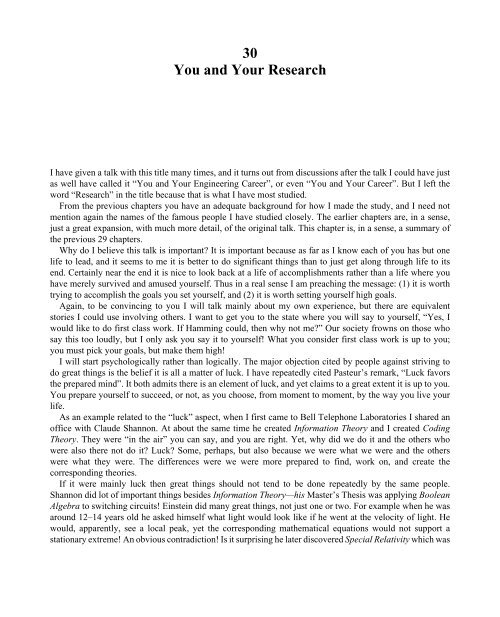hamming
hamming
hamming
Create successful ePaper yourself
Turn your PDF publications into a flip-book with our unique Google optimized e-Paper software.
30You and Your ResearchI have given a talk with this title many times, and it turns out from discussions after the talk I could have justas well have called it “You and Your Engineering Career”, or even “You and Your Career”. But I left theword “Research” in the title because that is what I have most studied.From the previous chapters you have an adequate background for how I made the study, and I need notmention again the names of the famous people I have studied closely. The earlier chapters are, in a sense,just a great expansion, with much more detail, of the original talk. This chapter is, in a sense, a summary ofthe previous 29 chapters.Why do I believe this talk is important? It is important because as far as I know each of you has but onelife to lead, and it seems to me it is better to do significant things than to just get along through life to itsend. Certainly near the end it is nice to look back at a life of accomplishments rather than a life where youhave merely survived and amused yourself. Thus in a real sense I am preaching the message: (1) it is worthtrying to accomplish the goals you set yourself, and (2) it is worth setting yourself high goals.Again, to be convincing to you I will talk mainly about my own experience, but there are equivalentstories I could use involving others. I want to get you to the state where you will say to yourself, “Yes, Iwould like to do first class work. If Hamming could, then why not me?” Our society frowns on those whosay this too loudly, but I only ask you say it to yourself! What you consider first class work is up to you;you must pick your goals, but make them high!I will start psychologically rather than logically. The major objection cited by people against striving todo great things is the belief it is all a matter of luck. I have repeatedly cited Pasteur’s remark, “Luck favorsthe prepared mind”. It both admits there is an element of luck, and yet claims to a great extent it is up to you.You prepare yourself to succeed, or not, as you choose, from moment to moment, by the way you live yourlife.As an example related to the “luck” aspect, when I first came to Bell Telephone Laboratories I shared anoffice with Claude Shannon. At about the same time he created Information Theory and I created CodingTheory. They were “in the air” you can say, and you are right. Yet, why did we do it and the others whowere also there not do it? Luck? Some, perhaps, but also because we were what we were and the otherswere what they were. The differences were we were more prepared to find, work on, and create thecorresponding theories.If it were mainly luck then great things should not tend to be done repeatedly by the same people.Shannon did lot of important things besides Information Theory—his Master’s Thesis was applying BooleanAlgebra to switching circuits! Einstein did many great things, not just one or two. For example when he wasaround 12–14 years old he asked himself what light would look like if he went at the velocity of light. Hewould, apparently, see a local peak, yet the corresponding mathematical equations would not support astationary extreme! An obvious contradiction! Is it surprising he later discovered Special Relativity which was


